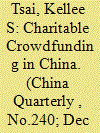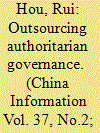| Srl | Item |
| 1 |
ID:
169792


|
|
|
|
|
| Summary/Abstract |
Social media in China has not only become a popular means of communication, but also expanded the interaction between the government and online citizens. Why have some charitable crowdfunding campaigns had agenda-setting influence on public policy, while others have had limited or no impact? Based on an original database of 188 charitable crowdfunding projects currently active on Sina Weibo, we observe that over 80 per cent of long-term campaigns do not have explicit policy aspirations. Among those pursuing policy objectives, however, nearly two-thirds have had either agenda-setting influence or contributed to policy change. Such campaigns complement, rather than challenge existing government priorities. Based on field interviews (listed in Appendix A), case studies of four micro-charities – Free Lunch for Children, Love Save Pneumoconiosis, Support Relief of Rare Diseases, and Water Safety Program of China – are presented to highlight factors that contributed to their variation in public outcomes at the national level. The study suggests that charitable crowdfunding may be viewed as an “input institution” in the context of responsive authoritarianism in China, albeit within closely monitored parameters.
|
|
|
|
|
|
|
|
|
|
|
|
|
|
|
|
| 2 |
ID:
193187


|
|
|
|
|
| Summary/Abstract |
How does privatization impact authoritarian governance on the frontline? This article examines the impact of outsourcing on the labour process involved in the operation of mayors’ hotlines. The mayor’s hotline system is a channel set up by Chinese municipal governments to address residents’ suggestions, appeals, inquiries, and complaints. While the expansion of mayors’ hotlines falls under the government in China, the operation of call centres has been outsourced to professional tele-corporations; thus, it is for-profit companies and their employees that represent the state in communications with the public. By examining both the practical and relational components of call operators’ labour process, this article looks at how an institution of responsive authoritarianism has been contracted out in China. It argues that the outsourcing creates a dual-pressure structure that shapes the frontline governance of this institution. The engagement of privatization in authoritarian domination leads to a conflict between market rationality and the inherited tradition of state intervention.
|
|
|
|
|
|
|
|
|
|
|
|
|
|
|
|